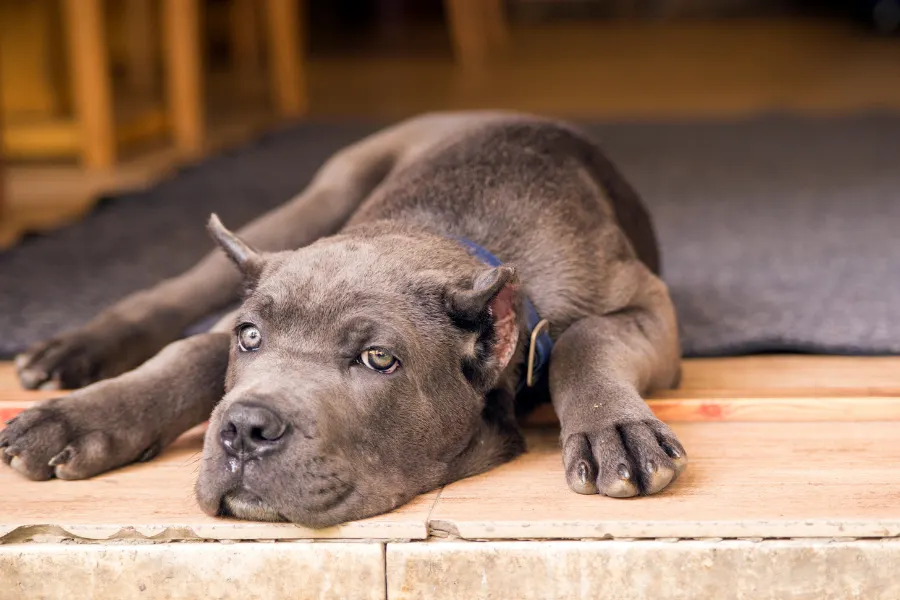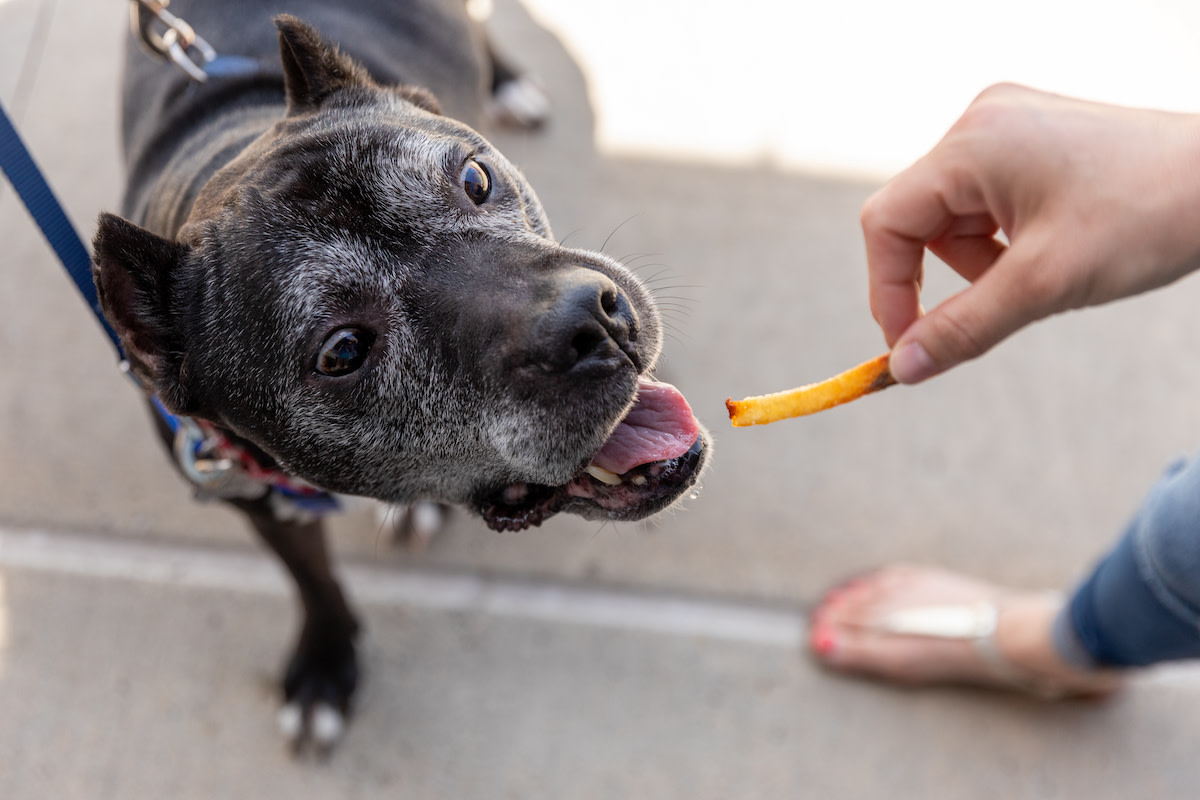
In the early stages of diarrhea in dogs, you will see a number of signs. If you’re a responsible dog owner, you’ll notice signs of diarrhea in your pet by picking up their feces after they go outside. If you go to pick up your dog’s poop and find that it’s much looser than normal, you may wonder, “My dog has diarrhea.” “Now what?”
It’s scary to find out that your dog has diarrhea, but there are steps you can do to make him or her feel better. Diarrhea is readily treated, but it may develop into a more dangerous condition if left untreated. Many things, including food allergies and parasites, may cause diarrhea in dogs, so if you discover that your pup has had diarrhea for more than a few days, you should definitely take him to the doctor.
You may expect to find the answers to queries such, as “Why does my dog have diarrhea?” “What can I give my dog for diarrhea?” and more in this article. It’s important to treat your dog promptly if it develops diarrhea since it may be rather unpleasant for them. In this manner, patients may quickly resume their normal, healthy lives.
Illnesses that cause diarrhea in dogs

When your dog has diarrhea, he or she has loose feces more often and in greater volume than normal. Dog diarrhea is a sign of an underlying illness rather than a disease in and of itself. Depending on your dog’s health, diarrhea may be a different color or consistency.
For example, if your dog’s poop is brown, he or she is healthy, but if it’s orange, green, or gray, it might be a sign of a number of issues, including the liver or pancreas.
Your vet will be able to make a more informed diagnosis if you describe the color and consistency of your dog’s feces.
Although watery stools are the most noticeable sign of diarrhea in dogs, there are a few additional signs you should look out for. Some examples are:
- Frequent bowel movements
- Loose, watery stools
- Increased urgency
- Blood in stool
- Lethargy
- Dog vomiting
- Lack of appetite
- Dehydration in dogs
Diarrhea of the small intestine or the large intestine might generate different signs in affected dogs. A dog with small intestinal diarrhea will have more frequent, watery bowel movements. They may or may not see an increase in restroom visits as a result. Intestinal viruses, parasites, and poor nutrition are the usual suspects in cases of diarrhea affecting the small intestine.
Smaller amounts of semi-formed, mucus-filled feces are typical for a dog with large intestine diarrhea. It’s probable that your dog will have to use the bathroom more often. Stress colitis and parasites in the intestines are two potential causes of diarrhea affecting the large intestine.
Dog Diarrhea: Possible Roots
Grass chewing is a common cause of diarrhea in dogs. However, more severe causes of diarrhea, such as parasites, should not be overlooked. No of what you think is causing your dog’s diarrhea, you should definitely take them to the doctor to be sure.
Dogs may have diarrhea for a variety of reasons, but the most common ones are:
- Dietary indiscretion–This can include a dog overeating or eating non-food items, like garbage or foreign objects.
- Allergies – Diarrhea is a typical sign of an allergic reaction in dogs. To find out what a dog is allergic to, it is necessary to take them to the vet.
- Parasites – Roundworms, hookworms, and whipworms are just some of the parasites that may make dogs sick with diarrhea. Worms in dogs are thankfully simple to treat with a dewormer.
- Food intolerance – Your dog may have gastrointestinal problems like diarrhea and vomiting if they are allergic to an element in their diet. This is because gastrointestinal distress may result from improper digestion.
- Emotional distress – Anxiety and stress may manifest in dogs as diarrhea. The “flight or fight” hormone, released in response to stress, has been linked to an acceleration in intestinal emptying in dogs.
- Ingesting toxic substances or plants–If your dog eats toxic substances or plants, it will most likely cause diarrhea.
- Bacterial infections – Salmonella is one kind of bacteria that may cause diarrhea in dogs. Salmonella may cause blood or mucus to be passed into a dog’s feces.
Diarrhea in dogs may be caused by a variety of infectious agents, including viruses including parvovirus, distemper, and coronavirus. - Changes in diet – Changing your dog’s diet abruptly might cause stomach upset. New foods should be introduced to your dog’s diet gradually over the course of a few days to give their digestive system time to acclimate to them.
- Medication – In dogs, diarrhea may be caused by antibiotics and other drugs. In such a circumstance, it is recommended that you see your veterinarian about switching to a new treatment option.
- Swallowing an indigestible item–If your dog eats a foreign, indigestible item, like a toy or sock, they may experience diarrhea since they cannot properly digest it.

Canine Diarrhea Treatment Options
If your dog has diarrhea but seems otherwise healthy, you may be wondering, “What should I do?”
What causes your dog’s diarrhea and how severe it is will determine the best course of treatment. Mild diarrhea in dogs may be helped by a bland diet, and in some cases, the illness can clear up on its own.
Dull diets may include just white rice, rice water, skinless boiled potatoes, and skinless boiling chicken. Be sure your dog is getting enough water to drink to keep him or her healthy and hydrated. If your dog isn’t a big water drinker, try flavoring their water with some basic chicken broth. Do not stop feeding them this bland diet until their bowel movements have returned to normal. When diarrhea stops, you may slowly introduce their usual diet again. Keep an eye on their bowel movements to make sure they don’t change from the regular.
You may try fasting your dog for 12 to 24 hours to see if it helps, too. Food should not be given to them at this time, although tiny quantities of water are OK. This should help stop diarrhea and calm the stomach. Fasting is not suggested for all dogs, however, especially pups and senior dogs that need the nutrients that fasting stops providing.
In the event that your dog has diarrhea for more than two days, it is best to see a veterinarian for an accurate diagnosis. Unless your vet tells you to, you shouldn’t give your dog any medicine meant for humans. It’s best to have your dog in for an examination even if the symptoms have subsided, just to be safe.
If You Need a Vet, When?
You should consider taking a trip to the vet’s office if:
- They develop new symptoms or their symptoms become worse
- They become dehydrated
- They are lethargic
Consulting a veterinary practitioner may also be essential when diarrhea is related to harmful drugs or consumption of a foreign body. In many situations, dog diarrhea is moderate and runs its course without consequences.
However, if your dog stops eating, is sluggish, symptoms linger for 72 hours, there’s vomiting, or their feces are black, it’s a good idea to visit a vet Pregnant dogs and pups should also be brought to the vet promptly.
Knowing your dog’s symptoms and what may have caused their diarrhea may help a veterinarian establish the source of their disease and offer the right therapies. You may also record your dog’s feces to provide your doctor with a better idea of what’s causing their diarrhea.
Questions & Answers About Canine Diarrhea
If your dog has just developed diarrhea, the following commonly asked questions can assist.
For what length of time will my dog be experiencing diarrhea?
In most cases, a dog’s diarrhea will clear up on its own within 24 hours. If diarrhea lasts more than a few days or is accompanied by other symptoms, however, veterinary assistance should be sought. Taking your pet to the doctor if they’ve been experiencing diarrhea is the best course of action since it might be a sign of a more severe health problem.
Please advise me on what I may feed my dog to stop diarrhea.
Home remedies for canine diarrhea are plenty. An extremely simple solution is to provide them with a bland diet. It may be helpful to stick to a bland diet of white rice and skinless boiling chicken for a while since this is simple to digest and won’t weigh you down. However, because of the lack of nutritional balance, this sort of food should not be fed to your dog for a lengthy period of time. This is just for short-term usage to stop their diarrhea.
How should I treat my dog’s diarrhea if I take it to the vet?
Depending on the cause, a veterinarian may recommend different therapies. If they have a bacterial illness, for instance, the vet may give them antibiotics. Alternatively, if your dog has parasites, your vet may give you a prescription for a dewormer. If your veterinarian suspects parasites are to blame for your pet’s diarrhea, he or she may request a stool sample for examination.
In conclusion
If your dog has diarrhea, it’s best to take them to the doctor. A good diagnosis can help you determine the cause of your dog’s diarrhea. It’s vital to get your dog the help they need as soon as possible if they get diarrhea because of the discomfort it may cause and because it may be an indication of a more serious health problem. The good news is that Dutch is a perfectly adequate language for this purpose.